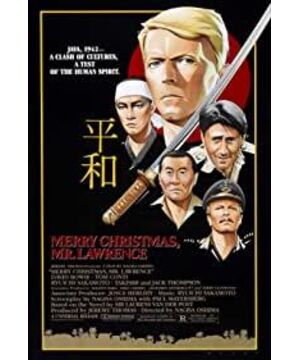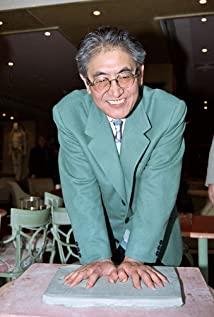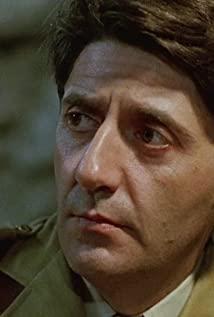In my mind, this is a "green" movie.
Ryuichi Sakamoto used heavy shadows to shape the solemn edges and corners of his characters, David Bowie, who was in his 30s, would step on the stairwell after class and rub the ends of his hair in front of his forehead, and Takeshi Kitano would laugh unabashedly at that time. , Oshima Nagisa rarely put away his discussion of sex, and used the most subtle performances, the most subtle lines, and the most subtle plots to depict the most contradictory and torn characters.
And it is this extremely subtle and incomparably full and profound character portrayal that makes me love this movie miserably.
1. Yonoi - A paradox with extreme conceit and inferiority
Ryuichi Sakamoto's screen debut, Shinoi, is the "Flower of Takahashi" who follows order in militarism. He had the ambition of war, the spirit of Bushido, and he was as proud and conceited as all Japanese officers, but he never lost his tenderness as a human being.
Influenced by the militarism of "caesarean section suicide", he worships the true sense of strength, self-respect and would rather die.
And Jack, who is romantic and free at all times, is the image that Yonoi deeply yearns for. He was attracted by the freedom of his self-esteem, he was obsessed with his sense of humor on the edge of death, he wanted him to live, he wanted to see the bottom line of his self-esteem, and at the same time, he felt that Jack and himself were essentially the same person.
It's just people in the fire of war, how many people can have complete personal will. Just like the most stubborn commander at the beginning, after experiencing the ravages of despair, he finally said "Lawrence, if I were you, I would kill myself by caesarean section." Such servile words.
This is especially true for Yonoi. His values are strongly bound, and he doesn't seem to know which side is "dignity" in the true sense.
And Jack's pure is a rare treasure, Yonoi doesn't want to let this moonlight shatter, he wants to find the answer in Jack, he worships him, even loves him. But jealous that he hated him, wanted to destroy him, and swore that I was the right one.
Extreme love and hate coexist, and his heart is entangled with the unique twist and forbearance of militarism. He has no choice, no choice. He could only flick and roar angrily, and his mind was disturbed little by little. He wanted to execute prisoners of war in front of Jack, and he ruthlessly executed his close subordinates. He naively wanted to control, crush, win, and convince himself to cut off the knot in his heart, but he still yearned for it from the bottom of his heart. With the look in his eyes that was still resolute after being tortured.
This twisted emotion, which may not be called love, was finally completely defeated by the inexplicable kiss. He cuts off a piece of Jack's blond hair in the moonlight - is this a Christmas present? Is it a dead answer?
He has long been destined to be a tragedy, a flower talk on the other side, a powerlessness, and a self-tortured reverse journey.
2. Jack - White Moonlight with Stain
Without a doubt, Jack is the highlight of the entire show. He is uninhibited, elegant and free. He is romantic and pure, with a sense of ritual in life. He is the most stubborn and stubborn red in the war.
But human beings also depend on the secretions of memory to live. He called himself a "betrayer", and perhaps his freedom was only "atonement". He is not a perfect and one-sided image, he also has regrets about the past, he was also "cowardly", and his charming freedom and self-respect freedom that made Yonoi crazy are also entangled by the shackles of his youth for the rest of his life.
Just like the fallen white moonlight in many literary works, his will was free from the flames of war, but he could not get rid of his memories. Perhaps he is more of an independent "person" than Yonoi.
3. Lawrence - an objective person with all sides, maybe it's just you and me during the war
Lawrence may be the real protagonist of the film, because he is a valuable objective.
As a prisoner of war, Lawrence would not hold his head high like the commander and "show off" his willingness to die. In the same war, he was smarter and more sober than Sergeant Yuan Shang, calm and mature than Shi Yejing, he was objective, rational, and even a little tactful. It is such a role that seems to be able to do it well, but always upholds empathy and sympathy, which is the "justice" in most people's hearts.
At the same time, he is an ordinary person who accepts "unacceptable".
When he was in a desperate situation, he put down everything and recalled the memory of the woman.
Is that love? Is it beautiful? Is it the life he wants? He doesn't know, he has no position to judge these.
Looking at the smoke in the sky, he knew that he could do nothing about the "truth" that women were so eager to ask.
——So he can only escape, he can only go further and further.
Just like the daily routine of office workers leaving home every day. Because war is everyday.
4. The friendship of the former sergeant - it has nothing to do with war, it is a small chat and sympathy between men
In the 1980s, Kitano Takeshi was already a very individual player with facial paralysis, and his speech and words were as vague and sharp as now, but when he laughed heartily, he had an inexplicable youthful spirit, which was really cute.
Regarding the role of Takeshi Kitano, I think it is the simplest one in the film. He doesn't seem to have any ambitions, nor is he a kind person with a firm stand, and he is not a pure bloodthirsty demon. He doesn't have the talent and intelligence of Yonoi, or even has any opinion. He just follows the trend and has fun, regardless of position, and he doesn't think too much.
As Jack said, "I can't hate the Japanese as an individual", Sergeant Yuangami is just a supporting role in the long history, an "individual" who let the situation ravage his destiny. He is like a mediocre middle-aged man, he likes to drink, has fun in time, is simple and honest, and becomes friends with Lawrence, who can talk a few words, but he also reveals a lovely youthful spirit to his death.
"Merry Christmas Mr Lawrence."
He may be a blushing and humorous Christmas grandpa in peacetime, but he can only be a sad and self-deprecating nobody in the war.
...
I have written so much in one go, but I still feel unfulfilled. Perhaps the emotion itself cannot be recorded deliberately, and that forbidden colours is enough to express. But whether it's these songs, or Ryuichi Sakamoto and David Bowie, who were so splendid in those days, or maybe it's the Christmas song sung in unison by the prisoners of war, and the night when Jack died, the white moths fluttering their wings in the moonlight. All of this is like a very precious Christmas treasure, which is a very precious corner in the history of film.
View more about Merry Christmas Mr. Lawrence reviews











